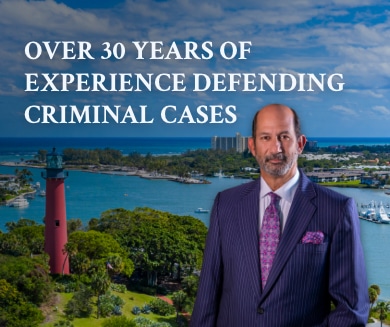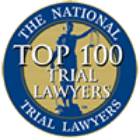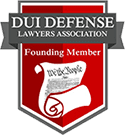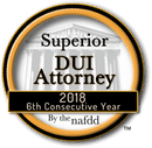Legally Reviewed By:
Brian P. Gabriel, Esquire
Prescription Drug Charges
Drug offenses in Florida are treated with particular severity by the courts—whether they involve synthetic substances created in laboratories or prescription medications obtained without proper authorization. The consequences of these charges extend far beyond courtrooms, affecting your reputation, career prospects, and personal freedoms for years to come. If you’re facing such charges, understanding the legal landscape and securing experienced representation is essential to protecting your future.
Criminal Defense Attorney Brian Gabriel brings over 30 years of experience defending clients against all types of drug charges in Palm Beach County. His comprehensive understanding of Florida’s complex drug laws and effective defense strategies has helped countless individuals navigate these challenging legal situations and achieve favorable outcomes.
The Legal Framework for Drug Charges in Florida
Florida categorizes controlled substances into five schedules based on their potential for abuse and accepted medical applications. This classification system, which mirrors the federal government’s approach, is crucial to understanding potential penalties for drug offenses.
Understanding Drug Schedules
Florida’s drug scheduling system, codified in Section 893.03 of the Florida Statutes, provides the foundation for how various substances are regulated:
- Schedule I: Drugs with high abuse potential and no accepted medical use (heroin, LSD, MDMA, many synthetic drugs)
- Schedule II: High potential for abuse but some accepted medical uses with severe restrictions (cocaine, methamphetamine, oxycodone, fentanyl)
- Schedule III: Moderate to low potential for abuse (anabolic steroids, ketamine, some products with limited amounts of codeine)
- Schedule IV: Low potential for abuse relative to Schedule III substances (Xanax, Valium, Ativan)
- Schedule V: Limited potential for abuse, primarily preparations containing small amounts of narcotics
The schedule under which a substance falls significantly impacts the severity of charges and potential penalties for possession, sale, or manufacturing. Additionally, Florida law specifically targets not just individual substances but also their chemical “analogs” or derivatives with similar structures, closing a loophole that drug manufacturers previously exploited.
Synthetic Drugs: Legal Risks and Consequences
Synthetic drugs represent a particular challenge for both law enforcement and legal defense. These laboratory-created substances attempt to mimic the effects of traditional illegal drugs while sidestepping existing drug laws through slight chemical modifications.
What Are Synthetic Drugs?
Unlike plant-derived substances such as marijuana or heroin, synthetic drugs are entirely chemical creations developed in laboratories. They’re often designed to produce similar effects to traditional illegal drugs while attempting to avoid legal classification as controlled substances.
Common synthetic drugs include:
- Synthetic cannabinoids (Spice, K2): Designed to mimic the effects of marijuana
- Synthetic cathinones (bath salts): Stimulants producing effects similar to amphetamines and cocaine
- Flakka (alpha-PVP): A potent stimulant that can cause extreme agitation and bizarre behavior
- Methamphetamine (crystal meth, crank, ice, or speed): A powerful stimulant that can be administered by smoking, snorting, injecting, or taking orally
- Synthetic opioids: These include various fentanyl analogs that can be significantly more potent than heroin
The popularity of synthetic drugs has skyrocketed, particularly methamphetamine. According to law enforcement data, there are nearly 500 registered meth labs throughout Florida. Part of this popularity stems from the fact that drugs like meth can be created using common household items that can be purchased legally at retail stores—including pseudoephedrine (found in cold medications), acetone, lithium (from batteries), ammonia, and various household chemicals.
Florida law now takes a broader approach to outlawing synthetic drugs by prohibiting not just specific formulations but also substances with “substantially similar” chemical structures to known illegal drugs. This closes the loophole that previously allowed manufacturers to make minor chemical adjustments to avoid legal consequences.
Legal Consequences for Synthetic Drug Offenses
Nearly all synthetic drugs are classified as Schedule I or II controlled substances. Possession of even small amounts can result in serious charges:
- Possession of less than 3 grams: First-degree misdemeanor, punishable by up to one year in jail and $1,000 in fines
- Possession of 3 grams or more: Third-degree felony, carrying up to five years in prison and $5,000 in fines
- Manufacturing, selling, or delivering synthetic drugs: Second-degree felony with up to 15 years imprisonment
- Trafficking in synthetic drugs: First-degree felony with mandatory minimum sentences depending on quantity
The trafficking thresholds and penalties escalate dramatically with quantity. For methamphetamine specifically:
- 14-28 grams: 3-year mandatory minimum prison sentence and fines up to $50,000
- 28-200 grams: 7-year mandatory minimum prison sentence and fines up to $100,000
- 200+ grams: 15-year mandatory minimum prison sentence and fines up to $250,000
A conviction for any of these offenses also results in the suspension of your driver’s license for up to one year, creating additional hardships for daily life, employment, and family responsibilities.
Prescription Drug Charges: From Medical Use to Criminal Offense
Prescription medications serve legitimate medical purposes when properly prescribed and used. However, possessing these medications without authorization—or using them in ways not directed by a healthcare provider—can result in serious criminal charges under Florida Statute 893.13(6)(a).
Common Prescription Drugs Leading to Charges
Several categories of prescription medications are frequently involved in criminal cases:
- Opioid painkillers: OxyContin, Vicodin, morphine, hydrocodone
- Benzodiazepines: Xanax, Valium, Ativan
- Stimulants: Adderall, Ritalin
- Sleep medications: Ambien, Lunesta
These medications typically fall under Schedules II through IV. Even though they have legitimate medical uses, unauthorized possession constitutes a criminal offense. In fact, due to the opioid epidemic, law enforcement agencies are particularly vigilant about monitoring prescription medications. In some cases, even healthcare professionals carrying medications as part of their professional duties have been questioned during routine traffic stops.
Prescription Drug Fraud
The epidemic of prescription drug abuse has led law enforcement agencies to crack down on various forms of prescription fraud, including the following:
- Doctor shopping: Visiting multiple physicians to obtain multiple prescriptions for the same or similar medications
- Forging prescriptions: Creating fraudulent prescription forms or altering legitimate ones to obtain larger quantities or additional refills
- Impersonating healthcare providers: Falsely claiming to be a doctor or pharmacist to obtain medications
- Using another person’s identity: Attempting to fill prescriptions using someone else’s name or insurance information
- Selling legally obtained prescription medications: Diverting prescribed medications to others for profit
These activities are typically charged as felony offenses, with penalties increasing based on the type and quantity of drugs involved. South Florida has been particularly hard-hit by the opioid epidemic, with numerous overdose deaths resulting from both legal and illegal prescription medications.
Penalties for Prescription Drug Offenses
The penalties for unauthorized possession of prescription drugs depend on several factors:
- Possession of Schedule II drugs (like oxycodone or hydrocodone): Third-degree felony, punishable by up to 5 years in prison and $5,000 in fines
- Sale, manufacture, or delivery of Schedule II substances: Second-degree felony with up to 15 years imprisonment
- Trafficking in prescription medications: First-degree felony with mandatory minimum
- sentences based on quantity
For example, trafficking just 4 grams of oxycodone can result in a mandatory 3-year prison sentence and $50,000 in fines. These penalties increase dramatically with larger quantities.
What many people don’t realize is that a felony drug conviction strips away several important civil rights, including:
- The right to vote
- The right to own or possess firearms
- The ability to serve on a jury
- Eligibility for certain professional licenses
- Access to federal student loans and grants
- Eligibility for some housing assistance programs
These collateral consequences can impact your life long after any prison sentence or probation has been completed, making it even more important to mount an effective defense against such charges.
Trafficking Charges: When Possession Becomes More Serious
When the amount of a controlled substance—whether synthetic or prescription—exceeds certain thresholds, possession charges can escalate to trafficking, even without evidence of actual sales or distribution activities.
The quantity thresholds for trafficking charges vary by substance. For example:
- Methamphetamine: 14 grams triggers trafficking charges with a 3-year mandatory minimum sentence
- Oxycodone/Hydrocodone: 4 grams can result in trafficking charges with the same 3-year mandatory minimum
- Synthetic opioids: Similar quantity thresholds apply, with penalties often matching those for traditional opioids
Trafficking charges almost always involve first-degree felony penalties, including the possibility of decades in prison for larger quantities. Additionally, these charges can involve asset forfeiture, where property connected to the alleged crime—including vehicles, cash, and even homes—may be seized by the government.
It’s important to understand that trafficking charges do not require proof that you were involved in a drug ring or that you were selling drugs. Simply possessing more than the statutory threshold amount is sufficient for trafficking charges. This means someone with a large quantity of medication for personal use could face trafficking charges identical to those faced by a large-scale dealer.
Differences Between “Actual” and “Constructive” Possession
Florida law recognizes two types of possession, which affects how these cases are prosecuted and defended:
Actual Possession
Actual possession means the substance was found directly on your person—in a pocket, purse, or hand. This is the most straightforward type of possession for prosecutors to prove, as there’s a direct physical connection between you and the controlled substance.
Constructive Possession
Constructive possession occurs when the substance wasn’t directly on your person but was found in a location under your control, such as your home, car, or a rented storage unit. To prove constructive possession, prosecutors must establish:
- You had knowledge of the presence of the drugs
- You had the ability to maintain dominion and control over the drugs
Constructive possession cases often provide more opportunities for defense, particularly in situations where multiple people had access to the location where drugs were found. Without additional evidence linking you specifically to the substances, prosecutors may struggle to prove the elements of constructive possession beyond a reasonable doubt.
Effective Defense Strategies for Drug Charges
When facing synthetic drug or prescription medication charges, several defense strategies may be available depending on the specific circumstances of your case.
Challenging Possession
For the prosecution to prove possession, they must establish that you had knowledge of and control over the substance. This can be challenging in cases of constructive possession, where drugs are found in a shared space like a vehicle or residence. If multiple people had access to the area where drugs were found, the prosecution may struggle to prove you were the person in possession.
Questioning Search and Seizure Procedures
Law enforcement must follow strict constitutional guidelines when conducting searches. If your rights were violated during a search—such as through a warrantless search without proper exceptions or exceeding the scope of consent—evidence obtained may be suppressed. This can often lead to the dismissal of charges if critical evidence becomes inadmissible.
Examining Laboratory Analysis
Both synthetic drugs and prescription medications require laboratory confirmation of their chemical composition. These analyses are not infallible—errors in testing, contamination of samples, or improper handling can all provide grounds to challenge the evidence. For synthetic drugs specifically, the chemical complexity can sometimes create difficulties in definitive identification.
Exploring Alternative Sentencing Options
Florida offers several alternative sentencing options for those facing drug charges, particularly first-time offenders:
- Drug court programs focus on rehabilitation rather than punishment
- Pretrial intervention programs that can lead to charges being dismissed upon completion
- Treatment-based programs addressing underlying substance abuse issues
These alternatives can provide a path to avoiding a criminal record while addressing any substance use issues that may have contributed to the arrest. For those with addiction issues, these programs can be particularly valuable in focusing on recovery rather than punishment.
The Entrapment Defense
Some drug prosecutions result from special police operations in which officers or confidential informants encourage illegal activities. If law enforcement coerced you to commit a crime you would otherwise be unlikely to commit—through threats, persistent enticement, or other improper tactics—an entrapment defense may be applicable. This requires showing that the government’s conduct created a substantial risk that an otherwise law-abiding person would commit the offense.
West Palm Beach Drug Defense Representation
The consequences of drug charges—whether involving synthetic substances or prescription medications—extend far beyond potential incarceration. A conviction can result in a permanent criminal record, lost professional opportunities, housing difficulties, and even family challenges.
If you’re facing charges related to synthetic drugs or prescription medications in Palm Beach County, experienced legal representation is critical. For over 30 years, Criminal Defense Attorney Brian Gabriel has defended countless clients throughout Palm Beach County against drug charges ranging from simple possession to trafficking. Mr. Gabriel will handle your case using all the knowledge and skills he has developed over the span of his career.
Start with a free consultation today by calling Criminal Defense Attorney Brian Gabriel of The Law Office of Gabriel & Gabriel at (561) 622-5575. You can also complete an online contact form to learn more.










